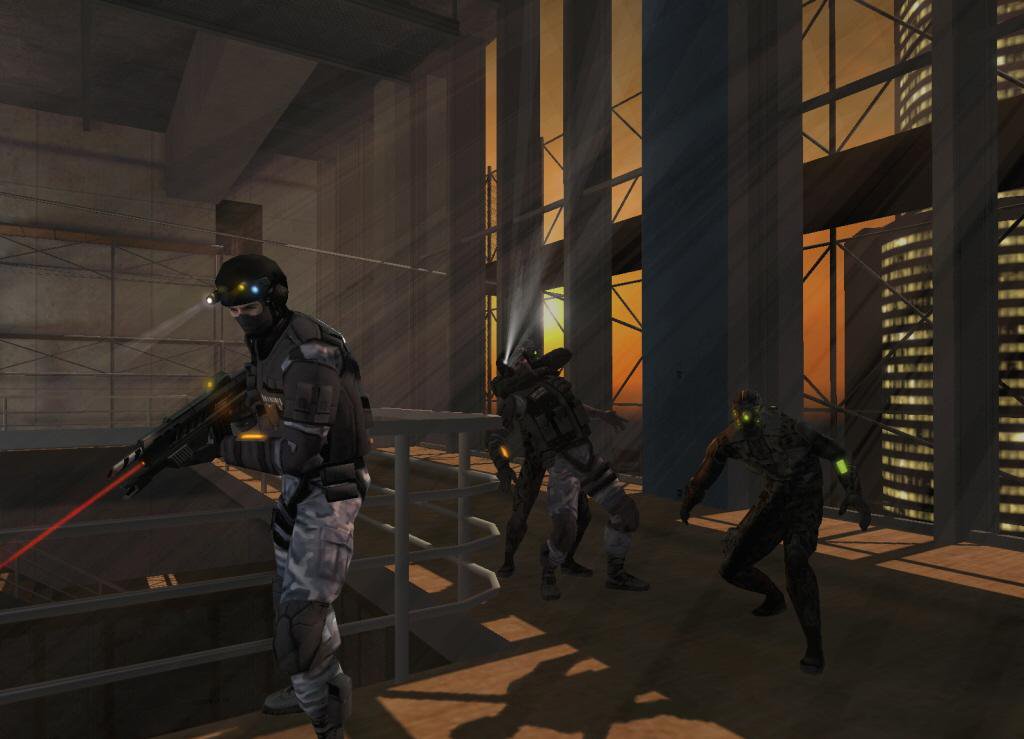Until today, I had half a dozen draft messages in the queue for a blog post, and just as I was about to pull the trigger on a finalist for the week, Johnny intervened. Because of this unfortunate turn of events, I now have seven draft messages in the queue, and it's time to push my previous frontrunner post to the backseat and instead talk about the highly relevant topic of Spies vs Mercs.
In 2004, one of the greatest video games of all time was released: Splinter Cell: Pandora Tomorrow. While this Tom Clancy franchise had an excellent single-player campaign with breathtaking graphics (at the time), the real game-changer was the introduction of a new multi-player concept called Spies vs Mercs. This 2-on-2 mode pitted 2 spies against 2 mercenaries in a death match of stealth vs force. As a spy, your job was to sneak around, disarm chemical weapons, and evade confrontation with the mercs using you speed and a myriad of tools such as heat vision and smoke grenades. You didn't carry deadly assault weapons, and when confrontation was inevitable, your best choice was a sneak attack from behind or above – a frontal assault with a merc was a suicidal death wish. Mercs took the opposite approach: they were slower and equipped with fewer spy gadgets, but their lack in stealth was more than made up for with the sheer amount of artillery they were equipped with to help guard the very equipment the spies were trying to disarm. When a spy was spotted, you lit up the room like Independence Day with assault rifles, grenades, and motion-sensor mines – a spy in your sights without a clear escape route was guaranteed cannon fodder.

This game was quite possibly the greatest contribution towards my lack of weekend productivity during my Junior year of college. For several months, three of my friends and I would take turns meeting up, each with an X-Box in tow, 50 feet of ethernet cables, and a ridiculously heavy CRT television. After setting up in various rooms of the house with no direct line of sight between each TV and network cables strewn throughout like tripwires, the night officially started... and usually didn't end until 3 or 4 am. If you're wondering whether the sleep-deprived days that followed were worth it or if this was a terrible use of my time that could've been spent learning other things, the answer is yes.
Now that we've taken this nostalgic journey of high-stakes espionage, let's ruin my college memories by using this story as a metaphor to how Johnny pissed me off this week. But before we get to Johnny, let's talk about Jenny.
Jenny is the creepy recruiter I recently wrote about that managed to somehow snag my private cell phone number and stalk me about wanting to fill an open position on my team a couple weeks ago. In the Spies vs Mercs world, Jenny was a spy: she sent me – and only me – a series of adrenaline-fueled emails, and when I didn't answer any of them she snuck one step further and called my office phone... then my cell phone... then sent another email wondering why I abruptly hung up on her when I realized who she was. She was laser focused on seeking me out via any means necessary, and I'm grateful no smoke grenades have rolled down my driveway while playing with my daughter outside.
And now – finally – we get to Johnny...

If Jenny was the stealthy spy, then Johnny was the fully armed mercenary ready to light the room up, but this time with LinkedIn direct messages instead of video game ammunition. I'm pretty sure I got the first message about a highly-qualified applicant for the data engineer position we just posted on my team. Then, I quickly found out he also messaged our internal recruiter; then our head of HR; then our various engineering and analytics leads – probably a dozen people in total within a span of two hours. After checking with my ex-wife, first grade teacher, and a random Instagram influencer I follow to see if they too received Johnny's messages, I was relieved to confirm the blast radius was limited to the company rolodex.
I was humored at this point, so I asked our internal recruiter to follow-up with Johnny to 1) see how quickly he would respond, and 2) confirm whether or not he had a legitimate candidate for us to review. To his credit, he did respond quickly and said he'd get back to us asap. And then, like Keyser Söze strutting away unscathed from a crime, Johnny was just... gone. It's been nearly a week since his last response, and no candidates have been submitted. Like a merc trying to clear a room of spies in my favorite multiplayer game, Johnny unloaded the DMs in a brilliant display of fury, and then sprinted to the next room to repeat the process without assessing the damage (to his reputation) that he just caused.
Recruiters, why do you do this? I'm a data guy, so I'm open to completely changing my opinion if you can show me empirical evidence supporting how the shotgun DM approach in LinkedIn results in more placements. And even if it does, that doesn't excuse a lack of tact. If you bombard every leader in an organization at once about a specific role, then at least have the gumption to follow through on delivering actual candidates in the scenarios where you do get a response. Unfortunately, and just like Jenny, I've had far too many Johnny experiences to consider this a one-off. This is a problem that clearly isn't going away anytime soon, which is unfortunate because the answer to this entire conundrum is really quite simple: don’t be a spy or a merc. Instead...
BUILD. AUTHENTIC. RELATIONSHIPS.
PS: The real names of the above culprits were changed to minimize public shaming. I may have strong opinions, but I also believe in professional redemption.
In 2004, one of the greatest video games of all time was released: Splinter Cell: Pandora Tomorrow. While this Tom Clancy franchise had an excellent single-player campaign with breathtaking graphics (at the time), the real game-changer was the introduction of a new multi-player concept called Spies vs Mercs. This 2-on-2 mode pitted 2 spies against 2 mercenaries in a death match of stealth vs force. As a spy, your job was to sneak around, disarm chemical weapons, and evade confrontation with the mercs using you speed and a myriad of tools such as heat vision and smoke grenades. You didn't carry deadly assault weapons, and when confrontation was inevitable, your best choice was a sneak attack from behind or above – a frontal assault with a merc was a suicidal death wish. Mercs took the opposite approach: they were slower and equipped with fewer spy gadgets, but their lack in stealth was more than made up for with the sheer amount of artillery they were equipped with to help guard the very equipment the spies were trying to disarm. When a spy was spotted, you lit up the room like Independence Day with assault rifles, grenades, and motion-sensor mines – a spy in your sights without a clear escape route was guaranteed cannon fodder.

This game was quite possibly the greatest contribution towards my lack of weekend productivity during my Junior year of college. For several months, three of my friends and I would take turns meeting up, each with an X-Box in tow, 50 feet of ethernet cables, and a ridiculously heavy CRT television. After setting up in various rooms of the house with no direct line of sight between each TV and network cables strewn throughout like tripwires, the night officially started... and usually didn't end until 3 or 4 am. If you're wondering whether the sleep-deprived days that followed were worth it or if this was a terrible use of my time that could've been spent learning other things, the answer is yes.
Now that we've taken this nostalgic journey of high-stakes espionage, let's ruin my college memories by using this story as a metaphor to how Johnny pissed me off this week. But before we get to Johnny, let's talk about Jenny.
Jenny is the creepy recruiter I recently wrote about that managed to somehow snag my private cell phone number and stalk me about wanting to fill an open position on my team a couple weeks ago. In the Spies vs Mercs world, Jenny was a spy: she sent me – and only me – a series of adrenaline-fueled emails, and when I didn't answer any of them she snuck one step further and called my office phone... then my cell phone... then sent another email wondering why I abruptly hung up on her when I realized who she was. She was laser focused on seeking me out via any means necessary, and I'm grateful no smoke grenades have rolled down my driveway while playing with my daughter outside.
And now – finally – we get to Johnny...

If Jenny was the stealthy spy, then Johnny was the fully armed mercenary ready to light the room up, but this time with LinkedIn direct messages instead of video game ammunition. I'm pretty sure I got the first message about a highly-qualified applicant for the data engineer position we just posted on my team. Then, I quickly found out he also messaged our internal recruiter; then our head of HR; then our various engineering and analytics leads – probably a dozen people in total within a span of two hours. After checking with my ex-wife, first grade teacher, and a random Instagram influencer I follow to see if they too received Johnny's messages, I was relieved to confirm the blast radius was limited to the company rolodex.
I was humored at this point, so I asked our internal recruiter to follow-up with Johnny to 1) see how quickly he would respond, and 2) confirm whether or not he had a legitimate candidate for us to review. To his credit, he did respond quickly and said he'd get back to us asap. And then, like Keyser Söze strutting away unscathed from a crime, Johnny was just... gone. It's been nearly a week since his last response, and no candidates have been submitted. Like a merc trying to clear a room of spies in my favorite multiplayer game, Johnny unloaded the DMs in a brilliant display of fury, and then sprinted to the next room to repeat the process without assessing the damage (to his reputation) that he just caused.
Recruiters, why do you do this? I'm a data guy, so I'm open to completely changing my opinion if you can show me empirical evidence supporting how the shotgun DM approach in LinkedIn results in more placements. And even if it does, that doesn't excuse a lack of tact. If you bombard every leader in an organization at once about a specific role, then at least have the gumption to follow through on delivering actual candidates in the scenarios where you do get a response. Unfortunately, and just like Jenny, I've had far too many Johnny experiences to consider this a one-off. This is a problem that clearly isn't going away anytime soon, which is unfortunate because the answer to this entire conundrum is really quite simple: don’t be a spy or a merc. Instead...
BUILD. AUTHENTIC. RELATIONSHIPS.
PS: The real names of the above culprits were changed to minimize public shaming. I may have strong opinions, but I also believe in professional redemption.